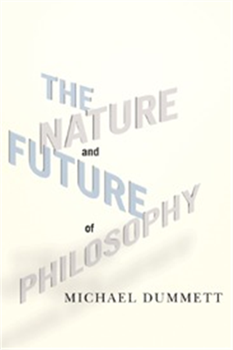Description
Philosophy is a discipline that makes no observations, conducts no experiments, and needs no input from experience. It is an armchair subject, requiring only thought. Yet that thought can advance knowledge in unexpected directions, not only through the discovery of new facts but also through the enhancement of what we already know. Philosophy can clarify our vision of the world and provide exciting ways to interpret it. Of course, philosophy's unified purpose hasn't kept the discipline from splintering into warring camps. Departments all over the world are divided among analytical and continental schools, Heidegger, Hegel, and other major thinkers, challenging the growth of the discipline and obscuring its relevance and intent. Having spent decades teaching in American, Asian, African, and European universities, Michael Dummett has felt firsthand the fractured state of contemporary practice and the urgent need for reconciliation. Setting forth a proposal for renewal and reengagement, Dummett begins with the nature of philosophical inquiry as it has developed for centuries, especially its exceptional openness and perspective-which has, ironically, led to our present crisis. He discusses philosophy in relation to science, religion, morality, language, and meaning and recommends avenues for healing around a renewed investigation of mind, language, and thought. Employing his trademark frankness and accessibility, Dummett asks philosophers to resolve theoretical difference and reclaim the vital work of their practice.
About the Author
A skilled analytic mind and an ardent voice against racism, Sir Michael A. E. Dummett is considered by many to be one of twentieth-century Britain’s most influential philosophers of language. Dummett is best known for his work in the history of analytic philosophy and in his contributions to the philosophy of language and mathematics. Much of his work has taken the form of commentary on the likes of Frege, Wittgenstein, and Quine. Dummett, who considered himself a Wittgensteinian, is widely held as the English authority on the work of German logician Gottlob Frege. Though Dummett diverges from Frege, who is a realist, most of Dummett’s achievements have been pursued in connection with his enthusiasm for Frege’s thought.Dummett was born in London in 1925 and attended prestigious boys’ schools in Wiltshire and Hampshire. Though he rejected religious belief in his youth, Dummett converted to Catholicism while serving in the armed forces during the Second World War. After his military service he went to Oxford University where he studied philosophy, politics, and economics at Christ Church College. He graduated in 1950 with first class honors and was awarded a fellowship at All Souls College. Throughout his acclaimed career Dummett remained associated with Oxford, though he has held visiting posts at several universities around the world. In 1962 he was appointed reader in the philosophy of mathematics at Oxford; in 1979 he was elected Wykeham Professor of Logic, where he served as chair until his retirement in 1992. Dummett, along with his wife, has remained active in antiracist campaigns and political reforms, even placing his philosophical career on hold for several years during the sixties to pursue these causes. He received a knighthood in 1999.Many of Britain’s leading analytic philosophers have been significantly influenced by Dummett, including Crispin Wright, Simon Blackburn, John McDowell, and Timothy Williamson — though none would be properly classed a disciple. Dummett’s most notable contributions have come in his analysis of theories of meaning accounting for communication, reason, and representation in language. His commitment to a kind of anti-realism in debates about reference and language, though often overstated, has been a point of particular interest for his admirers and detractors alike. Dummett was not satisfied with the pessimism of Wittgenstein and the holists who denied the possibility of finally understanding a language from within language. Dummett argues that an alternative can be found if one denies the principle of bivalence. Bivalence is the notion that every meaningful proposition is either true or false; and in Dummett’s view the denial of bivalence entails anti-realism about the reference of language.Dummett’s most influential writings are the first and second editions ofFrege: Philosophy of Language(1973–1981),The Interpretation of Frege's Philosophy(1981), and the 'William James Lectures' that he delivered at Harvard in 1976 published in 1991 asThe Logical Basis of Metaphysics. He also delivered a series of lectures at Bologna in 1987, published in 1988 asOrigins of Analytical Philosophy. In 1991 he published a collections of papers on Frege; and in 1993 a collection entitledThe Seas of Language.
